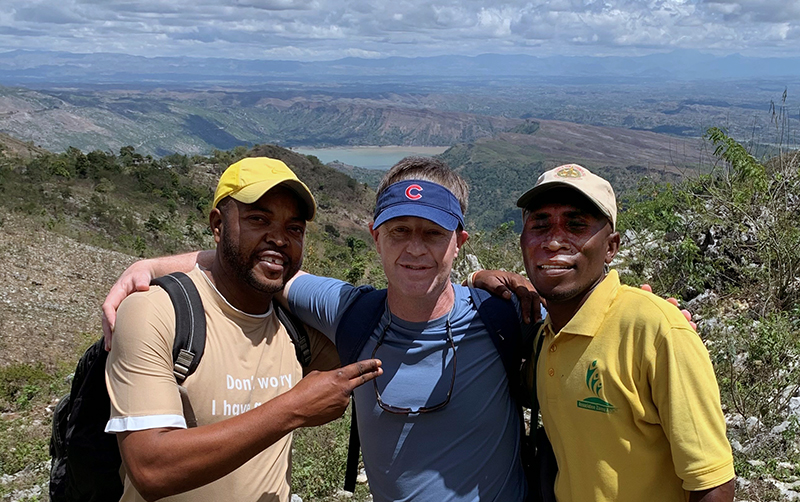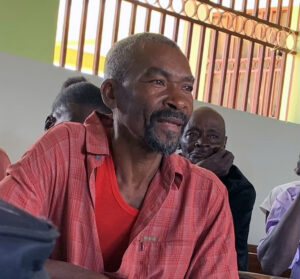The long hike to Morne Michel, a village inaccessible by vehicle, starts at the Pelige Dam. From there, it is five miles and thousands of vertical feet to the top of the mountain range. If you tell someone in Haiti that you are going to Morne Michel, they commonly say “li lwen.” It is far.
My first hike to the village was ten years ago. Each journey since brings excitement about renewing friendships, and anxiety about the physical challenge of the hike. This time, I am joined by my friend Jonel (on the left in this photograph), and by Mirabo, a graduate of the Partners in Agriculture agronomy school, who will lead the project at Morne Michel.
As the trail winds through the rural mountain farms, we are greeted at every turn with smiles and greetings, including “Bon Jou”, “Kouman ou ye?”, “Anfom?” Our paths cross with two young girls and discover that they are from Morne Michel and attending middle school in Cange (funding only exists for students to attend school through fifth grade in Morne Michel). They have no money to purchase food, and so must hike ten miles roundtrip simply to eat.
As the father of three girls in their teens, it is a sobering reminder of how different our lives are in the USA and how much we take for granted. It also reinforces why the work of Partners in Agriculture is so important in this community.
We arrive in Morne Michel and are reunited with old friends, including Emmanuel, who is a community leader in the school, church, and health programs. We are ushered into one of the classrooms where we meet with the 25 families identified by the community who would most benefit from the training, technical expertise, and the starter kit (seeds and goats) that would establish a foundation for them as they began their journey to food security.
The program is being funded by Trinity Episcopal Cathedral in Columbia, South Carolina. The church has an almost 20-year relationship with this remote community.
Mirabo explains that this program is a partnership with expectations for both parties. Partners in Agriculture commits to supplying quality seeds (seed germination is a significant issue in Haiti), healthy goats and the training and technical assistance necessary to educate and accompany the farmers as they learn how to increase the health of their animals and the yield of their crops. The farmers are expected to attend the trainings (arriving on time), and to follow the advice of Mirabo and Emmanua (the local technician) as the they work together to identify opportunities to increase production of their small farms.
There was a healthy dialogue during the meeting. The families asked to get the seed stock before the rainy season began and about the possibility of obtaining tree seedlings for farms that had coffee planted. Mirabo agreed, as deforestation and soil erosion are significant challenges in Haiti. I was excited to learn that part of the program would include a school vegetable garden (supported by the families) that would provide both education on proper farming techniques and supplement school meals which do not normally include fresh vegetables.
It has been five years since I was last in Haiti, and so much has changed. However, one thing that has not changed is the professionalism of the Partners in Agriculture team- and the hope and joy of the families that they are called to accompany to a more secure future.
– Jonathan Vipperman, Board Member of Partners in Agriculture


